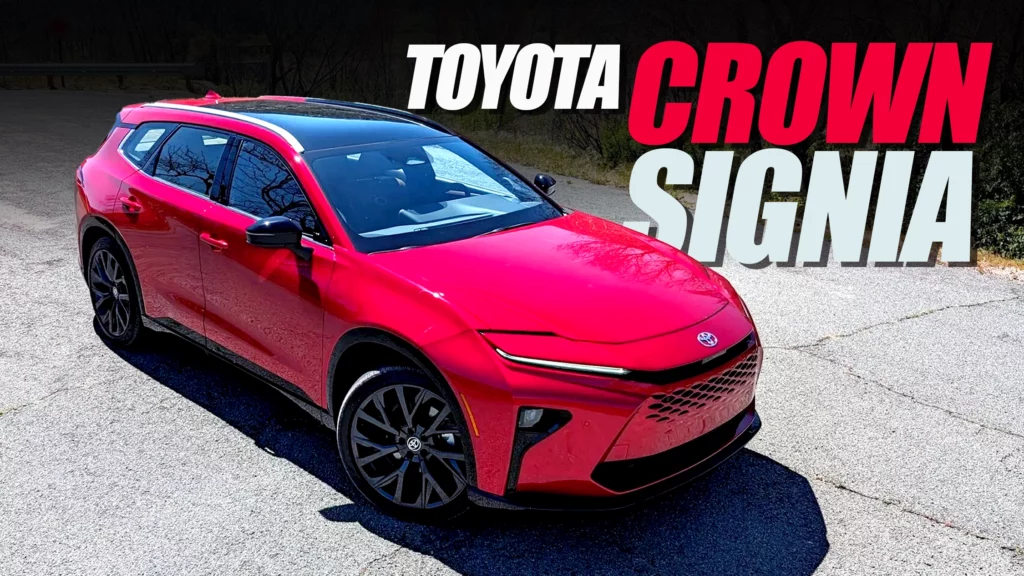
The all-new Crown Signia is aiming to steal sales from various segments and it’s brought many features to do the job
5 hours ago
“You’re more than one thing.” That was the start of Toyota’s first tagline for the Venza, an SUV/wagon/crossover that aimed to meet various needs. It was supposed to handle like a sedan, offer the upright seating position of an SUV, and haul stuff like something sort of in-between. When the original generation left production, it was replaced with what largely ended up being a fancy RAV4. Now, Toyota is going back to the drawing board with this, the Crown Signia.
It replaces the Venza in the lineup and returns to a tall wagon profile. At the same time, it hasn’t lost the premium DNA featured in the SUV it takes over for. As an expansion of the Crown family, this new crossover aims to offer a slew of high-end standard features throughout the entire lineup. If those words don’t make it clear just how ‘premium’ and ‘luxurious’ the Crown Signia is supposed to be, just look at it.
Review: 2024 Toyota Land Cruiser Is The 4-Runner For Grown Ups
The front end is clearly similar to both the Crown sedan and many of the latest Lexus models. It’s not just about looks either, this SUV comes standard with a hybrid powertrain and all-wheel drive. To find out if all of these components come together to form a car worthy of buyers’ consideration, we tested it in the hills just outside of San Diego, California. What we found out is that Toyota has laid the groundwork for a great all-around daily driver.
Quick Facts
All The King’s Horses
On paper, the Crown Signia’s powertrain sounds pretty straightforward. It’s a 16-valve 2.5-liter four-cylinder hybrid that sends up to 240 horsepower (178 kW) to all four wheels via a continuously variable transmission. Behind those simple words is a complex network that makes up the real powertrain. The gas engine itself makes just 188 hp (140 kW) and 178 lb-ft (241 Nm). It’s coupled to two electric motors and a planetary gear in the front of the Crown Signia.
The first motor (MG1) mainly serves as a generator and as the starter motor but also feeds power to the battery as the engine drives it. A second motor (MG2) drives the front wheels alone or in tandem with the gas engine. It too can act as a generator when coasting or braking. MG2 is the motor primarily used in EV mode. A third electric motor (MGR) is completely separate from the other parts of the powertrain and feeds power to the rear axle. At best, it creates 53 horsepower (40 kW) and 65 lb-ft (89 Nm) of torque.
The result of all that complexity is a powertrain that Toyota says will get up to 38 mpg combined but to achieve that figure, the automaker recommends using at least 87 octane. In theory, that type of mileage could make the Crown Signia capable of going 551 miles (887 km) between fill-ups thanks to a 14.5-gallon fuel tank. For those who care, the manufacturer estimates that it’ll take the Crown Signia 7.1 seconds to go from 0-60 mph (0-96 km/h) when pushed as hard as it can go.
Cabin Comforts
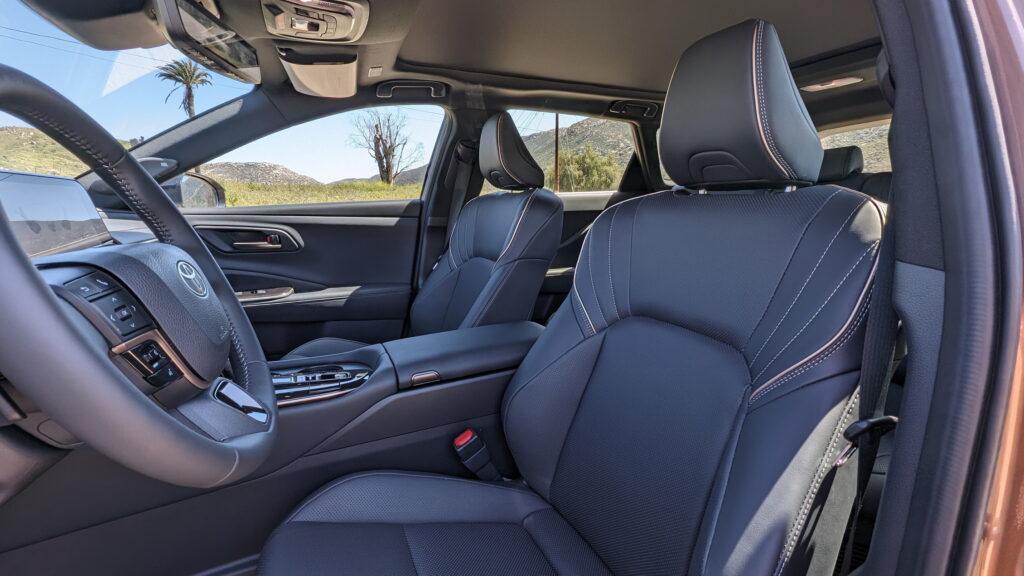
Toyota’s representatives stressed that the Crown line is all about coming to the market with the luxuries that customers want without having to add a bunch of packages or options. That’s certainly the general feeling in the cabin. Our main test car, a Crown Signia Limited, had an MSRP of $51,675 that included upcharges for a special color (Finish Line Red), the Advanced Tech package, and destination charges. At that price point, it looks like a decent value overall.
The Saddle Tan upholstery feels decidedly premium but the seats only adjust in eight total directions, which feels like a letdown. On the plus side, they come with heating, ventilation, and memory settings for the driver. The leather-trimmed steering wheel tilts and telescopes into a wide array of positions so it’s easy to find one that most drivers will enjoy.
Once situated, visibility is good. The pair of 12.3-inch screens, one for the gauge cluster and one for infotainment, stare back with crisp graphics. Interestingly, navigating the screens is very different depending on the one in question. The infotainment system is almost too simple-looking but the menus are logically laid out and intuitive.
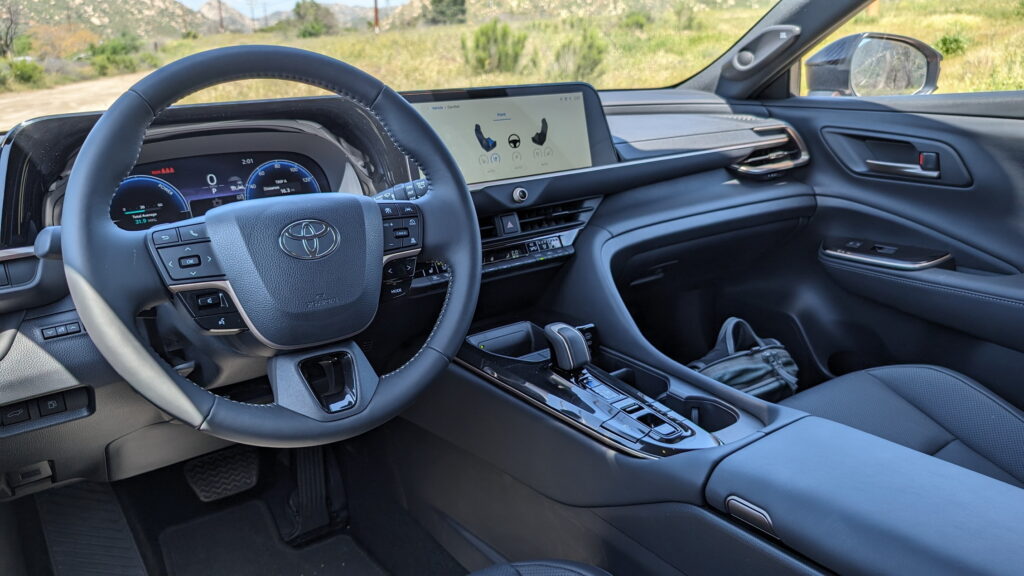
Android Auto and Apple CarPlay are standard and a cloud-based navigation system is also integrated for one year. Six speakers are standard but buyers can add an 11-speaker JBL system. The gauge cluster is another story though as navigating it requires overcoming a bit of a learning curve with the steering wheel buttons.
The rest of the cabin is very uncomplicated. The dash looks great and is flanked by cool-looking climate vents. Physical buttons, switches, and knobs enable simple climate control. The center console features an awesome storage center with a magic hinge that works for both the driver and the front passenger. Sadly, piano black plastics aren’t banished from the cabin but at least they’re kept to a minimum compared to some other cars out there.
One of the biggest highlights of the Crown Signia is how practical it is. The cargo area boasts up to 6.5 feet of flat storage space with a maximum of 68 cubic feet of space. Even with the rear seats in place cargo volume is 24.8 cubic feet with the panoramic roof and 25.8 without it. That’s more than enough for the average buyer on the average day. As is expected of a vehicle in this price point, the tailgate is a fully powered affair and the car comes with a removable cargo cover too. Both work about as easily as they possibly could.
Driving Impressions
While the Crown Signia as a car is a bit out of the norm for Toyota, the driving experience is anything but surprising. Like just about every other Toyota product save for the GR trio, the ride is smooth, comfortable, and sedate. It encourages one to relax, settle in, and enjoy the comfort features that come standard on the Crown Signia. The seating is plush but supportive and that goes for both rows. Taller occupants will immediately find the need to slouch but just about everyone else should be comfortable.
Piloting the Crown Signia is an easy if not somewhat insipid experience. The engine and hybrid components are super smooth and quiet at idle and at low load. In everyday traffic or while cruising on the highway it blends into the background and is largely forgettable. The steering provides just enough weight to make navigating streets or parking lots a breeze.
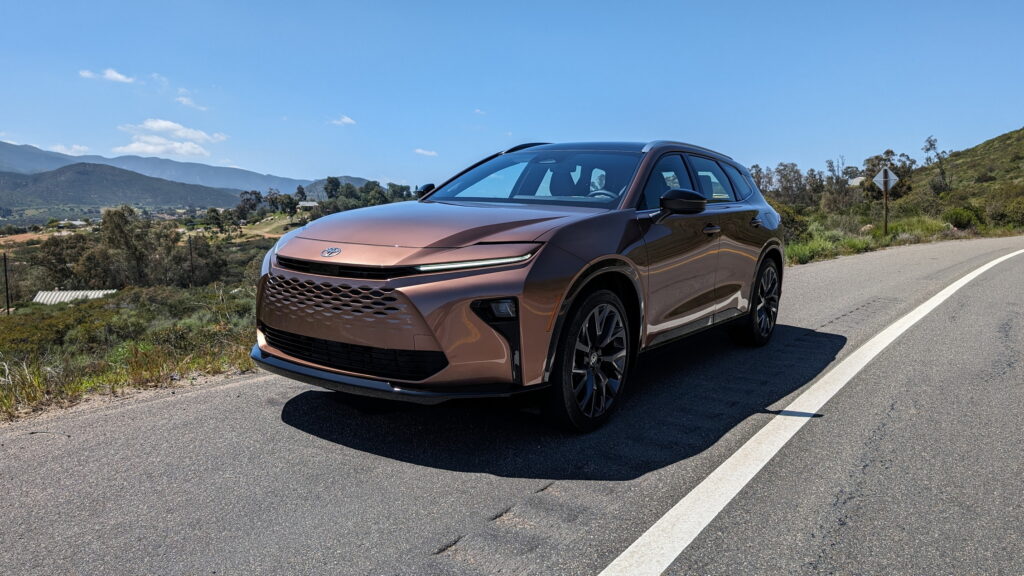
At the same time, the suspension and body do an excellent job of damping vibration and less-than-perfect road surfaces. That’s especially impressive considering that this vehicle rides on 21-inch wheels. While we didn’t get a chance to go soft-roading with the Crown Signia, we bet it’ll perform admirably there too thanks to 6.7 inches of ground clearance.
Push the Crown Signia a bit harder and a couple of components stand out. First, the CVT drones quite a bit, and despite mostly good sound insulation, the noise finds its way into the cabin. Second, this tall wagon feels planted and stable in the bends. The MacPherson struts in the front are accompanied by swing-valve shocks similar to the ones found in Lexus models. They do an excellent job of soaking up bumps while maintaining good traction.
Toyota says that it’s using a technology it calls Active Cornering Assist to reduce understeer. In effect, it uses stability control and the braking system to detect understeer and then to brake the inner wheel. While we didn’t exactly take the Crown Signia to an Autocross course, we did drive it hard enough to feel like the system acts as intended. What was frustrating though was the driver aids intended to take the stress out of the experience.
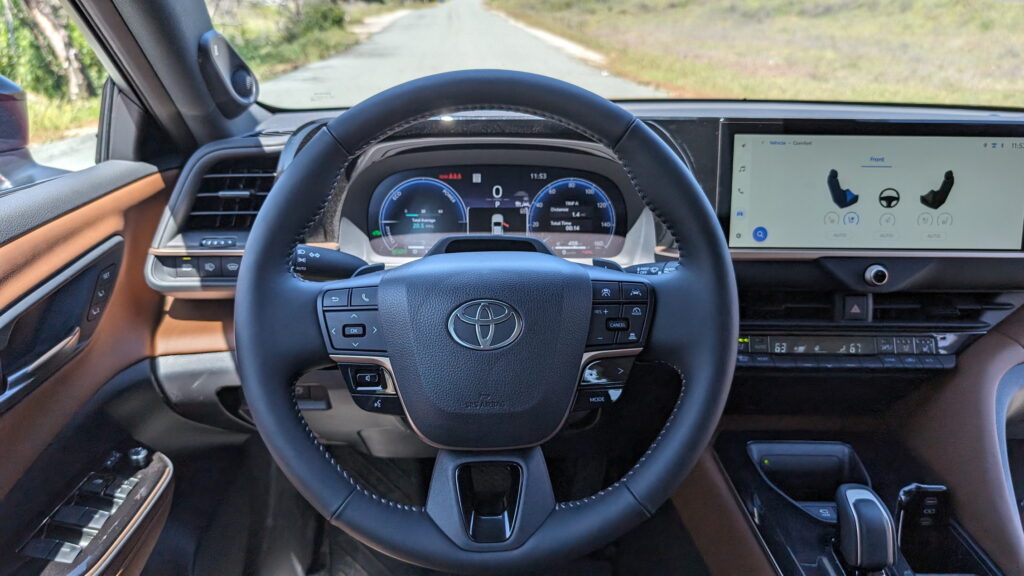
The adaptive cruise control and lane-following technology uses a camera mounted on the steering wheel to monitor driver attention. While the ACC and lane-following work great on their own, the camera is overly sensitive and signals a warning in the dash even for momentarily glances at road signs that aren’t directly ahead of the driver. That was the case when we drove the Lexus RX too so it’s unfortunate to see that Toyota hasn’t fixed the issue.
As we found in our testing of the new Toyota Camry, the regenerative braking in the Crown Signia is smooth, progressive, and free of the choppy nature that some hybrid braking systems exhibit. While our testing probably isn’t typical of the average Crown Signia buyer, we still managed to achieve 35.7 mpg with a mix of city and highway driving. In short, the Crown Signia handles well and is slow to accelerate but is comfortable which is the one thing most buyers in this segment will care most about.
Competition
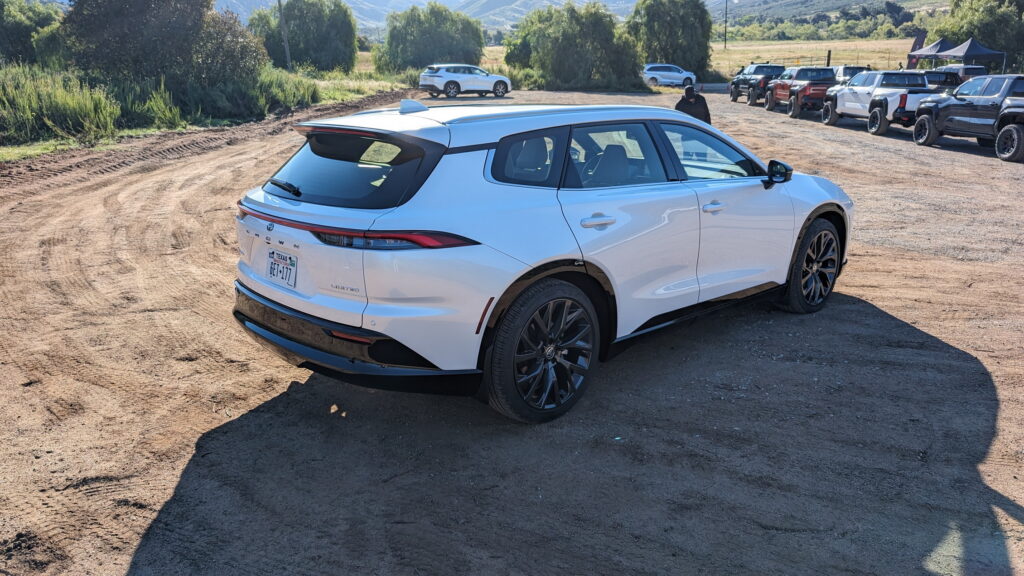
Seeing as the Crown Signia is sort of various things, it could end up getting cross-shopped by buyers in the sedan, SUV, and wagon market. With that in mind, it’s hard to compare it to everything out there. Still, we can narrow down a few of its direct competitors. For instance, the Subaru Outback probably looks the most like the Crown Signia and offers a similar package of basic features.
At the same time, the Crown Signia starts at about $15k more than the Outback but to its credit, it comes with far more technology, a much better interior, and a hybrid drivetrain that offers far better fuel economy than the Subaru could ever dream of. What the Outback has going for it is that the top trim costs about the same as a Crown Signia and offers far better on-road performance and better off-road capability.
The Lexus NX might be a better comparison as it shares many components with the Crown Signia. In addition, it starts at a lower price, is still available with a 2.5-liter hybrid four-cylinder, and offers almost as much cargo space with 23 cubic feet behind the second row. Notably, some will prefer a Lexus badge over a Toyota Crown one enough to go for it.
Finally, something like the Audi A4 Allroad could also be in the running for someone interested in the Crown Signia. It starts at just over $48,000 and comes with a 261 hp (194 kW) engine. Perhaps even more importantly, it gets a real seven-speed gearbox which already offers far more engagement than the Toyota. Audi’s excellent Quattro AWD system is standard too but keep in mind that the A4 Allroad will only achieve, at best, 30 mpg. There’s always a tradeoff for a more engaging driving experience.
Final thoughts
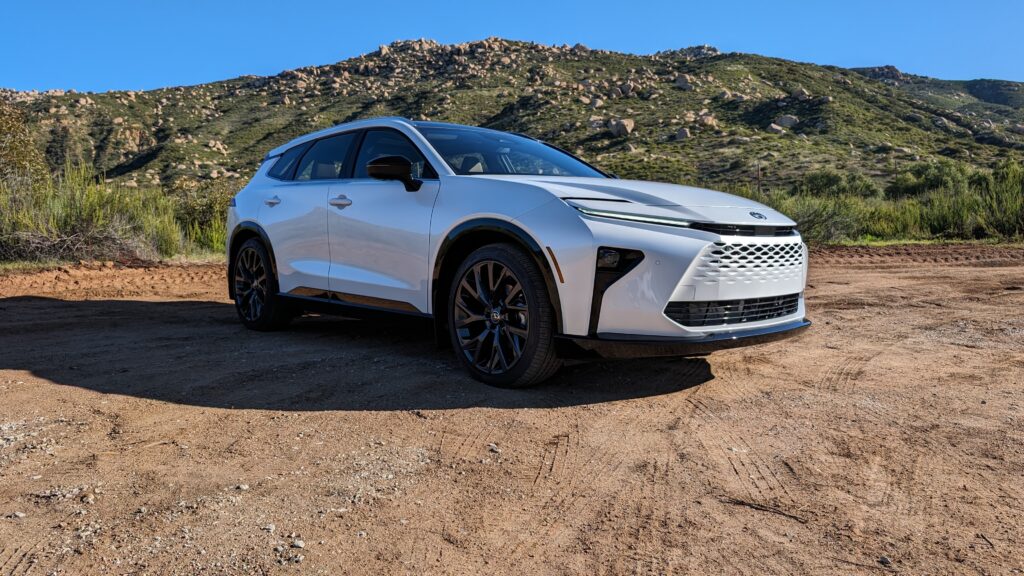
The Crown Signia is a jack of all trades and a master of none. As a person who drives a tall wagon (Ford Flex Limited), I can personally attest to just how beneficial it is to own such a flexible vehicle. The Crown Signia takes what most Toyota buyers love about the Crown or the Camry and adds a lot more practicality. In the case of the Camry, the Crown Signia offers a lot more comfort and luxury too.
It’s a sincerely good all-around vehicle that can do everything from haul tons of gear to transport five (not tall) people in comfort over a long journey. It has its flaws. It’s not fun to drive, its CVT drones at full throttle, and its driver aids are too touchy. Nevertheless, buyers interested in such a vehicle might have a tough time justifying anything else.

stromectol order online – candesartan 8mg uk tegretol us
buy accutane 40mg online – buy zyvox order linezolid online cheap
buy generic azithromycin – buy azithromycin 250mg pill buy bystolic pills for sale
omnacortil pills – progesterone 200mg brand order prometrium generic
order lasix 100mg pill – betamethasone for sale online3 oral betnovate 20gm
order augmentin online cheap – buy ketoconazole cymbalta usa
amoxiclav pills – augmentin online cymbalta 40mg without prescription
semaglutide usa – semaglutide 14 mg without prescription order periactin 4 mg generic
brand sildenafil – cialis prices cialis 40mg usa
cost of cialis – buy viagra 50mg generic viagra 100mg sale
cenforce 50mg price – purchase metformin pill purchase glycomet generic
buy generic lipitor 10mg – buy atorvastatin pills order prinivil pills
generic omeprazole – brand lopressor buy atenolol 50mg generic
order depo-medrol online cheap – pregabalin medication purchase aristocort sale
buy generic clarinex for sale – order generic loratadine 10mg priligy generic
order acyclovir 800mg pills – order allopurinol 100mg sale order rosuvastatin generic
order coumadin 2mg – buy reglan 20mg generic cozaar generic
order nexium online cheap – generic topiramate purchase imitrex online cheap
levaquin 500mg uk – avodart order online ranitidine medication
buy mobic 7.5mg without prescription – buy cheap generic celebrex buy tamsulosin online
order zofran 4mg without prescription – zocor 10mg pill purchase simvastatin online cheap
provigil medication order provigil 100mg without prescription buy modafinil purchase modafinil sale provigil 100mg for sale provigil 100mg sale provigil 100mg brand
I am in truth enchant‚e ‘ to glitter at this blog posts which consists of tons of useful facts, thanks for providing such data.
Thanks for sharing. It’s top quality.
buy zithromax tablets – buy metronidazole for sale order flagyl 200mg online cheap
buy rybelsus 14mg sale – buy cyproheptadine 4 mg for sale periactin 4 mg without prescription